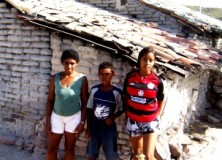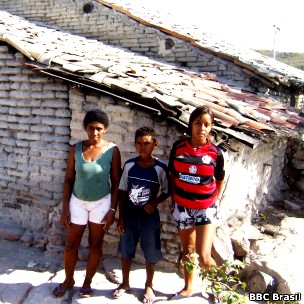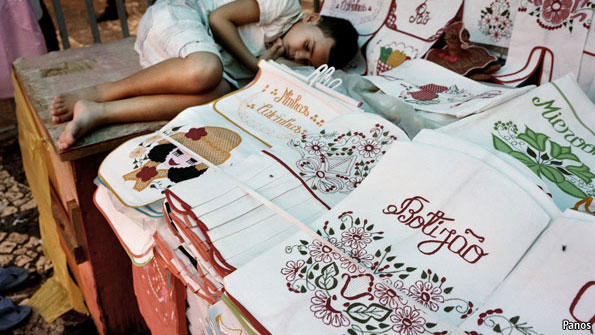
The limits of Brazil’s much admired and emulated anti-poverty programme
THREE generations of the Teixeira family live in three tiny rooms in Eldorado, one of the poorest favelas (slums) of Greater São Paulo, the largest city in the Americas. The matriarch of the family, Maria, has six children; her eldest daughter, Marina, has a toddler and a baby. Like many other households in the favela, the family has been plagued by domestic violence. But a few years ago, helped in part by Bolsa FamÃlia (family grant)—which pays mothers a small sum so long as their children stay in education and get medical check-ups—Maria took her children out of child labour and sent them to school.
The programme allows the children to miss about 15% of classes. But if a child gets caught missing more than that, payment is suspended for the whole family. The Teixeiras’ grant has been suspended and restarted several times as boy after boy skipped classes. And now the eldest, João, aged 16, is out earning a bit of money by cleaning cars or distributing leaflets, taking his younger brothers with him. Marina’s pregnancies have added to the pressure. She gets no money for her children because she lives with her mother and the family has reached Bolsa FamÃlia’s upper limit. After rallying for a while, the Teixeira family is sliding backwards, struggling more than it did a couple of years ago.
Their experience does not mean Bolsa FamÃlia has been a failure. On the contrary. By common consent the conditional cash-transfer programme (CCT) has been a stunning success and is wildly popular. It was expanded in 2003, the year Luiz Inácio Lula da Silva became Brazil’s president, and several times since; 12.4m households are now enrolled. Candidates for the presidency (the election is on October 3rd) are competing to say who will expand it more. The opposition’s José Serra says he will increase coverage to 15m households. The ruling party’s Dilma Rousseff, who was Lula’s chief of staff, says she is the programme’s true guardian. It is, in the words of a former World Bank president, a “model of effective social policy†and has been exported round the world. New York’s Opportunity NYC is partly based on it.
Much of this acclamation is justified. Brazil has made huge strides in poverty reduction and the programme has played a big part. According to the Fundaçao Getulio Vargas (FGV), a university, the number of Brazilians with incomes below 800 reais ($440) a month has fallen more than 8% every year since 2003. The Gini index, a measure of income inequality, fell from 0.58 to 0.54, a large fall by this measure. The main reason for the improvement is the rise in bottom-level wages. But according to FGV, about one-sixth of the poverty reduction can be attributed to Bolsa FamÃlia, the same share as attributed to the increase in state pensions—but at far lower cost. Bolsa FamÃlia payments are tiny, around 22 reais ($12) per month per child, with a maximum payment of 200 reais. The programme costs just 0.5% of gdp.
But the story of the Teixeiras and others like them should sound a warning to those who see Bolsa FamÃlia as a panacea. There is some evidence the programme is not working as well in cities as in rural areas—and the giant conurbations of developing countries are where the problems of poverty will grow in future.
This concern differs from the usual complaints about the programme in Brazil. There, critics think it erodes incentives to work and sometimes goes to the wrong people. On the whole, though, studies have not borne out these complaints. A recent report for the United Nations Development Programme found the programme did not lead to dependence and that its impact on the labour market was slight. According to World Bank researchers, Bolsa FamÃlia’s record in reaching its target audience is better than most CCTs.
Worries about the imbalance between rural and urban benefits may be harder to brush away. Bolsa FamÃlia does seem to have a rural bias. Rural poverty is great in Brazil but even so, the programme’s incidence in rural areas is high: 41% of rural households were enrolled in 2006, against 17% of urban ones. In the two largest cities, São Paulo and Rio de Janeiro, fewer than 10% of households are in the programme. Yet these cities contain some of the worst poverty in the country.
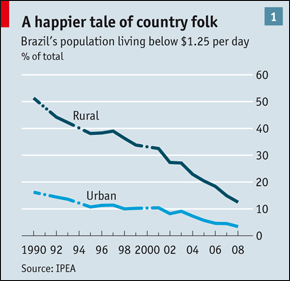 Brazil’s success in cutting poverty seems to have been greater in rural areas than in urban ones. Bolsa FamÃlia does not publish figures on urban and rural poverty but the official report on the United Nations’ millennium development goals does. The most recent progress report, published in March, said that rural poverty fell by 15 points in 2003-08, much more than the urban rate (see chart 1).
Brazil’s success in cutting poverty seems to have been greater in rural areas than in urban ones. Bolsa FamÃlia does not publish figures on urban and rural poverty but the official report on the United Nations’ millennium development goals does. The most recent progress report, published in March, said that rural poverty fell by 15 points in 2003-08, much more than the urban rate (see chart 1).
Impressive though they are, these figures, based on household survey data, may understate the fall. Income and spending figures suggest poverty as a whole is lower (they show almost 8m fewer people in absolute poverty). Rafael Osório of the Institute for Applied Economic Research (IPEA) thinks rural poverty rates may well be lower than 12%. If so, Bolsa FamÃlia has done an even more splendid job in the countryside than it seems.
Other evidence supports this. Rural malnutrition among children under five in the arid parts of the north-east (one of Brazil’s poorest regions) has fallen from 16% to under 5% since 1996. And since 1992 the proportion of rural children in primary education has caught up with that of city children, while rural enrolment in secondary schools has increased faster than the urban rise (see chart 2).
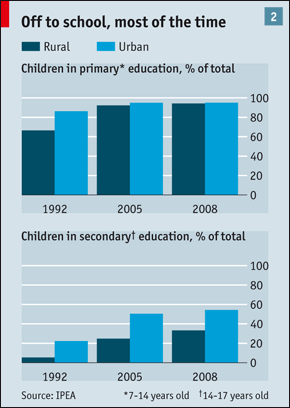 Because poverty in rural Brazil used to be higher than urban poverty, a larger reduction is both natural and desirable. In the 1990s there were fewer social benefits in rural regions so a nationwide programme was bound to help them more. Moreover, as the ministry of social development, which administers Bolsa FamÃlia, points out, the programme was never designed to be run in a uniform way. Local areas use different methods so some variation is inevitable.
Because poverty in rural Brazil used to be higher than urban poverty, a larger reduction is both natural and desirable. In the 1990s there were fewer social benefits in rural regions so a nationwide programme was bound to help them more. Moreover, as the ministry of social development, which administers Bolsa FamÃlia, points out, the programme was never designed to be run in a uniform way. Local areas use different methods so some variation is inevitable.
Despite all this, the cities remain a problem. In absolute terms there are as many poor people in urban areas of Brazil as there are in rural (because the country in general is largely urban). And there are three reasons for thinking Bolsa FamÃlia works less well in the towns.
The first is that, in urban areas, the introduction of the programme has left some people worse off. When Bolsa FamÃlia was expanded in 2003, it subsumed an array of other benefits, such as a programme against child malnutrition, subsidies for cooking fuel, stipends for youngsters between 15 and 16, and so on. Though hard to prove (national figures are not available), anecdotal evidence suggests that the family grant can be worth less than the former array of benefits.
Jonathan Hannay, the British secretary-general of the Association for the Support of Children at Risk, a charity in Eldorado, reckons that in his favela households like the Teixeiras used to be able to get the equivalent of two minimum wages (for a family of six) from the old benefit system. The average Bolsa FamÃlia grant is a fifth of the minimum wage. One city, Recife, even decided to top up benefits to former welfare recipients when the programme started. More generally, the cost of living in cities is higher than in the countryside, so the family grant (which is the same size across the country) is worth less.
Second, the programme seems to have had little success in reducing child labour in cities. In fact, its record on child labour in general has been rather disappointing, but the urban problem seems more intractable. In rural areas parents take children out of school to help with the harvest. This is, in part, a cultural phenomenon: children learn farming by working the fields. They are often not paid. But their work is temporary and, since children are allowed to miss 15% of school days without penalty, rural kids may be able both to work and stay in the programme.
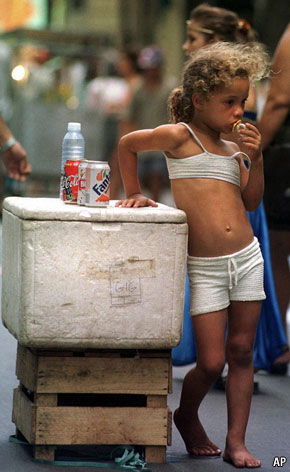 Child labour in cities is different. Children earn money selling trinkets, working as maids and so on, and their earnings are often greater than the modest benefits from Bolsa FamÃlia. So there is an economic incentive to cut school and leave the programme. Of the 13,000 households who lost their grant because of school truancy in July, almost half were in São Paulo alone. The real damage done by child labour happens when the children have no education at all—and that is more likely to happen in cities.
Child labour in cities is different. Children earn money selling trinkets, working as maids and so on, and their earnings are often greater than the modest benefits from Bolsa FamÃlia. So there is an economic incentive to cut school and leave the programme. Of the 13,000 households who lost their grant because of school truancy in July, almost half were in São Paulo alone. The real damage done by child labour happens when the children have no education at all—and that is more likely to happen in cities.
Third, Bolsa FamÃlia may affect the structure of households in favelas more than in the countryside. Family benefit goes to the head of a household (almost always the mother). But in densely populated favelas, where—surprising as it may seem—housing is expensive, and where a young woman is likely to stay with her mother after she has her own child, the new benefit still goes to the head of the household, ie, the new child’s grandmother. This is what happened to the Teixeiras. It may, some observers fear, produce a sort of double dependency, on family grant and on family matriarch.
None of this means that Bolsa FamÃlia is, on balance, a waste of money in urban areas. As the FGV’s Marcelo Neri points out, the programme shows the state in a new and better light in favelas: as a provider of benefits in places where it has either been absent or present only in the form of brutal police squads.
In addition, the elaborate bureaucracy built up by the programme—every household gets a debit card and the ministry of social protection runs a giant database with every transaction—should make it easier to be more precise in targeting the needy. More important, it should make it possible to use the Bolsa network to do new things, such as helping teenagers of 16 and 17 who are products of the system train and look for work. It should also be possible for cities to top up the family grant. Rio de Janeiro is designing a new programme, called Bolsa Carioca, to do exactly that.
Still, there has been a tendency to treat Bolsa FamÃlia as magic bullet—in Brazil and beyond. Once a country has a Bolsa FamÃlia-type programme, it thinks it has dealt with the problems of poverty. It has not. Rômulo Paes de Sousa, the executive secretary of Brazil’s social-development ministry, talks about “old†and “new†poverty—old being lack of food and basic services; new being drug addiction, violence, family breakdown and environmental degradation. These “new†problems are more complex. Where they are being overcome, it is taking the combined efforts of the police (to reclaim the streets), new shops and commerce (to make life more bearable), Pentecostal churches (which give people hope)—and Bolsa FamÃlia.
Rural Brazil, with its malnutrition and absence of clean water and clinics, is an area of old poverty and Bolsa FamÃlia has been wonderfully effective in fighting it. But many of the problems of fast-growing cities, particularly in developing countries, are those of new poverty. And nobody, including the designers of Bolsa FamÃlia, has a magic bullet for those.
Source: The Economist – july 29, 2010
 Adelvan da Paixão, de 30 anos, comprou uma moto, um guarda-roupas de seis portas e uma cama de casal depois que voltou de viagem.
Adelvan da Paixão, de 30 anos, comprou uma moto, um guarda-roupas de seis portas e uma cama de casal depois que voltou de viagem.